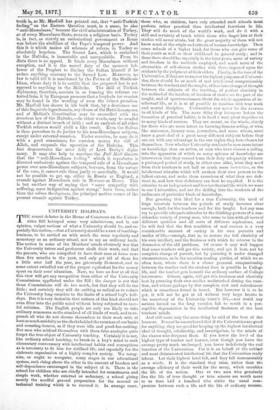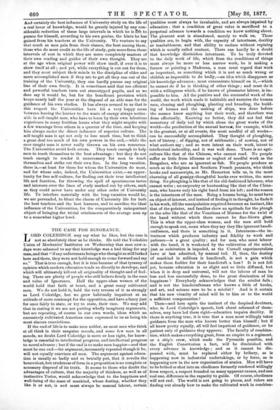UNIVERSITY HOLIDAYS.
THE recent debates in the House of Commons on the Univer- sities Bill betrayed some very mischievous, and in our opinion, vulgar notions of what a University should be, and es- pecially this notion ,—that a University should be a sort of teaching- business, to be carried on with much the same regularity and monotony as an ordinary school, not to say an ordinary trade. The notion in som‘ e of the Members' minds obviously was that the University tutors and professors skulk their work, and that the parents, who are compelled to have their sons at home more than five months in the year, and only get rid of them for a little over half the year, are grievously ill-treated, and to some extent swindled out of the proper equivalent for the money spent on their sons' education. Now, we have no fear at all that this view will get any recognition from either of the University Commissions appointed under the Bill ; the danger is not that these Commissions will do too much, but that they will do too little ; and certainly they will do nothing so radical as to reduce the University long vacation to the limits of a school boy's holi- days. But it is very desirable that notions of this kind should not even filter into the public mind without being subjected to care- ful criticism. The English people are only too likely to take ordinary commerce as the standard of all kinds of work, and to re- proach all who do not devote themselves to their work with at least as much assiduity as the clerks behind the counters of our banks and counting-houses, as if they were idle and good-for-nothing. But men who mislead themselves with these false analogies quite forget the true object of University teaching. Certainly it is not, like ordinary school teaching, to break-in a boy's mind to such elementary conversancy with intellectual habits and conceptions as is necessary to fit him for civilised life, and especially for the elaborate organisation of a highly complex society. We recog- nise, or ought to recognise, many stages in our educational systems each rising above the other in the amount of freedom and self-dependence encouraged in the subject of it. There is the school for children who are chiefly intended for monotonous and simple work, whether external or sedentary, a school giving merely the needful general preparation for the manual or technical training which is to succeed it. In average cases, those who, as children, have only attended such schools must perform rather practical than intellectual functions in life. Theyi will do much of the world's work, and do it with a skill and certainty of touch which those who linger late at their studies will never attain, but the great majority of them will not know much of the origin and criteria of human knowledge. Then come schools of a higher kind, for those who can give some of their youth as well as their childhood to general study ; and in these there should be, especially in the later years, more of variety and freedom in the methods employed, and much more of the alternation of self-chosen studies with those imposed upon the students by the judgment of their elders. Finally, in the ease of the Universities, if they are to answer the highest purposes of Universi- ties, there should be as much of real intellectual companionship between the teachers and the taught, of free interchange of thought between the subjects of the teaching, of perfect elasticity in the method of the teacher, of freedom of choice on the part of the taught, and of spontaneousness about the whole apparatus of in- tellectual life, as it is at all possible to combine with true work and mental discipline. Universities can never be the avenues to all kinds of life. The mere delay they interpose before the formation of practical habits, is in itself a very great impediment to many kinds of success. They are meant, on the whole, chiefly for those who are more intent on knowing than on acting, or who, like statesmen, literary men, journalists, and some others, must know a great deal of a great many different subjects before they can act with any advantage in the one region they have chosen for themselves. Now whether University students be men more intent on knowledge than on action, or men who have chosen a calling into the apparatus of which so many spheres of knowledge are interwoven that they cannot learn their duty adequately without a prolonged period of study, in either case alike, what they need from their teachers is not half so much mere instruction, as the intellectual stimulus which will awaken their own powers to the fullest extent, and make them conscious of what they are defi- cient in, and how that deficiency can best be supplied. It is the stimulus to an independent and free intellectual life which we want in our Universities, and not the drilling into the students of the rudiments of particular kinds of knowledge.
But granting this ideal for a true University, the need of large intervals between the periods of study becomes clear enough, both for the teachers and for the taught. Let any man try to provide adequate stimulus to the thinking-powers of a con- siderable variety of young men, who come to him with all sorts of different qualities and all sorts of different aspirations, and he will find that the first condition of real success is a very considerable amount of variety in his own pursuits and modes of life,—enough, that is, to restore the full elasticity of his own intellect, and the freshness with which be returns to the discussion of the old problems. Of course it may well happen that some teachers will get this variety, and get it best, not by complete change of pursuit, but by pursuing it under changed circumstances, as in the vacation reading parties, of which we so often bear, where there is a closer personal companionship between the teacher and the student than is possible in College life, and the teacher gets beneath the ordinary surface of College intercourse. Others, again, will get this freshness and elasticity best by pursuing their own studies undisturbed during the vaca- tion, and others perhaps by that complete rest and refreshment which is sometimes found in travel. But however it is to be got, it will not be got at all without very large breaks in the monotony of the University tutor's life,—nor could any serious inroad on the long vacation fail to result in a per- ceptible degeneration in the intellectual freshness of the best teachers' minds.
And still more may the same thing be said of the best of the learners. It must be remembered that if the Universities are good for anything, they are good for keeping up the highest intellectual ideal of thought, scholarship, and investigation, in the minds of the classes who frequent them. If you lower the level of the highest type of teacher and learner, even though you leave the average pretty much unchanged, you lower indefinitely the real function of the Universities. For it is on behalf of the noblest and most disinterested intellectual life that the Universities really labour. Let their highest level fall, and they fall immeasurably as a whole. It is the standard they raise, rather than the average efficiency of their work for the many, which ennobles the life of the nation. One or two men who genuinely live the life of true thought or true science are worth more to us than half a hundred who strike the usual com- promise between such a life and the life of ordinary success. And certainly the best influence of University study on the life of a real lover of knowledge, would be greatly injured by any con- siderable reduction of these large intervals in which he is Aft to pursue for himself, according to his own genius, the hints he has gained from his teachers at the University. We venture to say that much as men gain from their classes, the best among them, those who do most credit to the life of study, gain more from those intervals of rest in which they are more completely masters of their own reading and guides of their own thought. They are at the age when original power will show itself, if ever it is to show itself at all ; and yet, while everything is cut out for them, and they must subject their minds to the discipline of older and more accomplished men if they are to get all they can out of the training of the University, they can hardly pursue any original line of their own freely. It is sometimes said that too efficient and powerful teachers turn out stereotyped pupils, and so we dare say it would be, but for the beneficent provision which keeps nearly half the year at the disposal of an able man for the guidance of his own studies. It has always seemed to us that in this respect the Universities have hit a very happy mean between leaving the learner to the waste of energy always notice- able in self-taught men, who have to learn by their own laborious experience in many fruitless hours what they might acquire with a few warnings from others in a quarter of the time, and keeping him always under the direct influence of superior culture. The self-taught man is apt not only to lose much time, but to think a great deal too much of his own powers in the end,—while the over-taught man is never really thrown on his own resources. The Universities avoid both errors. They teach enough to help men to teach themselves to the best advantage ; but they do not teach enough to render it unnecessary for men to teach themselves and strike out their own line. In the long vacation, there is,—at least for those for whom the Universities do most, and for whose sake, indeed, the Universities exist,—an oppor- tunity for free self-culture, for finding out their true intellectual life and function, for throwing the spell of spontaneous tastes and interests over the lines of study marked out by others, such as they could never have under any other order of University life. To interfere materially with the long vacation would be, we are persuaded, to blunt the charm of University life for both the best teachers and the best learners, and to sacrifice the ideal influence of the Universities, for the comparatively unimportant object of bringing the trivial attainments of the average man up to a somewhat higher level.



































 Previous page
Previous page